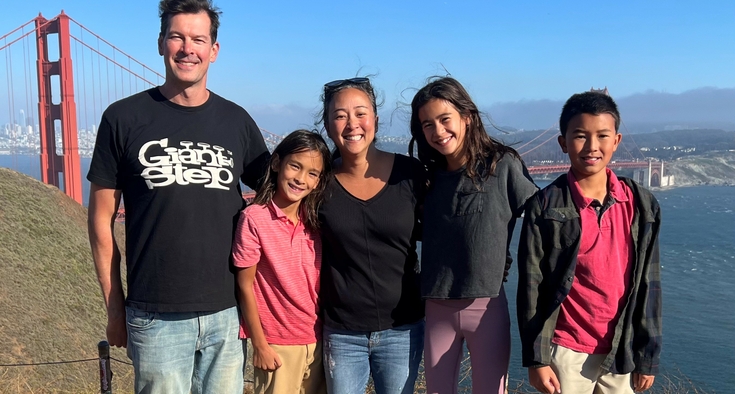By Carole Tanzer Miller, Novant Health Healthy Headlines
To find and book a physician, click here.
Jeanne Sayers is the sort of person U.S. experts had in mind in 2021 when they began recommending colorectal cancer screening starting at age 45 — five years earlier than before.
She had no personal or family history of cancer. She had none of the warning signs. A busy mother of three and director of development at the Summit School in Winston-Salem, Sayers, 46, let her screening slip until she got a My Chart reminder that probably saved her life.
On June 27, her first colonoscopy found a tumor in her rectum. The cancer had already begun to spread.

“If she had waited until 50, it would have been too late,” said colorectal surgeon Dr. David Hiller of Novant Health Pelvic Health Center in Winston-Salem.
Tissue for a biopsy analysis was obtained during Sayers’ colonoscopy, a procedure in which a flexible tube with a light and camera is moved through the rectum and large intestine to check for problems. That could include small growths, called polyps, that can become cancerous and are typically removed during the procedure. Patients are sedated for the exam.
Weeks later, Hiller later used precision robotics to remove the tumor and a portion of Sayers’ rectum surrounding it, along with 27 nearby lymph nodes. Two tested positive for cancer.
Sayers, who is undergoing chemotherapy to lower the risk for cancer returning, expects her treatment to be complete by year’s end. She’ll get tested regularly after that to make sure she’s cancer-free.
Already, she has emerged as a vocal advocate of colonoscopy.
“There’s really no convenient time to get a screening,” Sayers said, recalling that she canceled her colonoscopy once and almost a second time because she had other things to do.
It’s a cliché at this point: The prep is worse than the procedure. You can’t eat the day before and there is lots of bathroom time as your system is flushed in advance. But the exam can potentially prevent cancer or catch it early, as in Sayers’ case, and increase your chances of continuing with a normal life.
“There’s really no convenient time to have cancer,” Sayers added. “I just feel so lucky that mine was caught early.”
Top honors for Novant Health hospitals
Her care illustrates an approach to treatment that has earned four Novant Health cancer centers a coveted seal of approval from the National Accreditation Program for Rectal Cancer (NAPRC).
Novant Health’s Presbyterian Medical Center in Charlotte, Forsyth/Clemmons Medical Center, Huntersville Medical Center and Matthews Medical Center are among six North Carolina cancer centers and just 89 nationwide certified as centers of excellence in rectal care. All four earned perfect scores during the NAPRC review.
“With some accreditations, you’re in good graces if you achieve the minimum, and with this program, it was the opposite — the standards were basically the maximum, and anything short of that isn’t good enough,” said Hiller, director of Novant Health’s rectal cancer program.
“In other words,” he added, “We have objective evidence that we are the best center for rectal cancer in central and western North Carolina.”
Chalk it up to teamwork.
A team of Novant Health rectal cancer specialists — including surgeons, oncologists, radiologists and cancer navigators — meets weekly to review each patient’s case and map out the best course of treatment.
“It’s really a team effort that requires a lot of thought and intentionality — and that’s how you get better results,” Hiller said, noting that U.S. treatment outcomes have traditionally lagged those in Europe where health care systems are less compartmentalized and more unified.
Sayers said that teamwork has made her journey much easier.
“Nowhere in my care has there been any sort of disconnect from what I was hearing from doctor to doctor — from the GI doctor to the surgeon to the oncologist,” she said. “It was almost like one was prepping me for what the other would say.”
‘Just get your colonoscopy’
Other than feeling tired and queasy at times, and battling the sometimes fuzzy thinking known as “chemo brain” that often goes along with treatment, Sayers is carrying on.
She and her husband, Benjamin, an emergency room doctor at Novant Health Forsyth Medical Center in Winston-Salem, are maintaining as normal a routine as they can with their three kids — Sonny, 12, Emmett, 10, and Lucas, 8.
Since they learned in June that Sayers has cancer, the kids’ questions have run the gamut from the possibility of chemo-related hair loss (maybe) to the likelihood that they will need to begin screening colonoscopies even sooner than age 45 (yes, for sure).
“We don’t have all the answers, but we do know that it’s early, and we know that it hasn’t spread far,” Sayers said. “People have asked me, ‘What can we do to help? And I respond, ‘Just get your colonoscopy.’ I feel like that’s the easiest thing for people to do.”
Five fast facts
1 — Colorectal cancer is the third-leading cause of cancer death in the U.S.
2 — The American Cancer Society projects nearly 107,000 new cases of colon cancer and more than 46,000 new rectal cancers in the U.S. this year.
3 — While overall rates of colorectal cancer have dropped since the mid-1980s — mainly because of screening — they have risen by 1% to 2% a year in people under 50 since the mid-1990s.
4 — That trend led the U.S. Preventive Services Task Force in 2021 to lower the recommended age for screening from 50 to 45 for people at average risk.
5 — A colonoscopy is the only cancer screening test in which suspicious tissue can simultaneously be removed.
Know this: If you receive a diagnosis for colon or rectal cancer, our team of medical oncologists at Novant Health will listen to your needs and map out the best treatment plan for you. Our colorectal surgeons use the latest minimally invasive procedures ease your healing.
Find the care you deserve here.
Novant Health
Healthy Headlines
Facebook
Instagram
Twitter
YouTube




